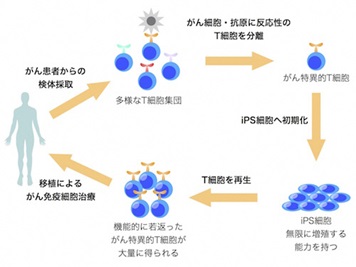ここから本文です。
サイアス株式会社(京都企業紹介)Thyas Co., Ltd.
知恵の経営、元気印、経営革新、チャレンジ・バイの各認定等を受けた府内中小企業を紹介するページです。
iPS細胞技術を用いたがんに対する再生免疫細胞療法 Regenerative immune cell therapy for cancer using iPS cell technology

(掲載日:平成30年3月19日、聞き手・文:ものづくり振興課 足利)
サイアス株式会社(京都市)の等代表取締役にお話をおうかがいしました。
iPS細胞で再生したT細胞によるがんに対する再生免疫細胞療法 Regenerative immune cell therapy for cancer using T cells regenerated with iPS cells
―何をされてらっしゃる会社ですか?What does your company do?
等) ヒトiPS細胞からT細胞を再生し、がんや感染症に対する再生免疫細胞療法の製剤を提供することを目指して、日夜研究開発を行っています。弊社の技術は京都大学iPS細胞研究所(CiRA)の金子新准教授を中心に開発されました。We are conducting research and development day and night with the aim of regenerating T cells from human iPS cells and providing regenerative immune cell therapy formulations for cancer and infectious diseases. Our technology was developed mainly by Associate Professor Arata Kaneko of Kyoto University iPS Cell Research Institute (CiRA).
―T細胞とおっしゃいますと?T cells?
等) T細胞は、白血球の成分の一つで、腫瘍や外部から侵入したウイルスが感染した細胞などを攻撃します。腫瘍やウイルス感染細胞は細胞表面上に腫瘍やウイルスに特異的なタンパク質の一部(抗原)を発現しており、T細胞はその抗原を認識します。またT細胞は認識する抗原を記憶しており、再び侵入してきた場合や再発の場合に腫瘍やウイルスを排除することが可能です。T cells are a component of white blood cells that attack tumors and cells infected with viruses that invade from the outside. Tumor or virus-infected cells express a portion of tumor- or virus-specific proteins (antigens) on their cell surfaces, and T cells recognize these antigens. Additionally, T cells memorize the antigens they recognize, making it possible to eliminate tumors and viruses in the event of re-invasion or recurrence.
―なるほど。I see.
等) 免疫応答をうまく利用することによって、従来の治療法(手術、放射線、抗がん剤)では治療効果が見られない末期のがん患者の一部で、完治に近い治療効果が得られるようになってきました。弊社では、がん患者のがん組織中または血液中のT細胞の中から、がんに特異的な抗原を認識して細胞障害性を示すものを分離し、一旦iPS細胞に変換して再分化させ治療に利用することを目指しています。By making good use of the immune response, we hope to be able to achieve a near-complete cure for some terminally ill cancer patients for whom conventional treatments (surgery, radiation, anti-cancer drugs) are ineffective. It has become. At our company, we isolate T cells that recognize cancer-specific antigens and exhibit cytotoxicity from the cancer tissue or blood of cancer patients, convert them into iPS cells, and regenerate them. We aim to differentiate and use it for treatment.
―それをiPS細胞を使って行われるということですが、iPS細胞だとどういう良いことがあるのでしょうか?I hear that this is done using iPS cells, but what are the benefits of using iPS cells?
等) がん患者さんの体内では、がんを認識するT細胞は疲弊した状態にあり、腫瘍に対して細胞障害性を示せないことが最近の研究でわかってきました。それらを取り出して体外で増やそうとしてもなかなか増えてくれません。またT細胞は過剰に増殖させると機能を失う傾向にあります。iPS細胞は高い増殖能を持ちますので、iPS細胞に一旦変換することによりこれらの問題を解決することができます。T細胞の抗原認識能は遺伝子の上に記憶されていますので、iPS細胞に一旦変換しても再生したT細胞は全く同じ抗原認識能を持ちます。iPS細胞技術を用いると腫瘍に特異的で疲弊のない若いT細胞を大量に得ることが可能です。これらの若いT細胞は高い増殖能と細胞障害性を示すことが実験的に示されています。私どもの製造するT細胞を患者さんに戻すことで高い治療効果が期待されます。Recent research has revealed that in the body of cancer patients, T cells that recognize cancer are exhausted and cannot exhibit cytotoxicity against tumors. Even if you take them out and try to multiply them outside the body, they will not grow easily. Additionally, T cells tend to lose their function when overproliferated. Since iPS cells have a high proliferative ability, these problems can be solved by converting them to iPS cells. The ability of T cells to recognize antigens is stored in their genes, so even if they are converted into iPS cells, the regenerated T cells will have exactly the same ability to recognize antigens. Using iPS cell technology, it is possible to obtain large numbers of young, tumor-specific T cells that are not exhausted. These young T cells have been experimentally shown to exhibit high proliferative potential and cytotoxicity. We expect high therapeutic efficacy by returning the T cells we produce to patients.

生産の効率化・安定性に京都のものづくり技術を Applying Kyoto manufacturing technology to improve production efficiency and stability
―素晴らしい。Oh!
等) iPS細胞由来再生T細胞を用いた治療法は、患者個人のT細胞を用いる自家移植法と、健常人ドナーから作製したT細胞を多くの患者に用いる他家移植法に大別できます。私たちは、まずは、T細胞のドナー(提供側)とレシピエント(受領側)の適合性等の問題がない自家移植を優先して開発を行い、1日も早く安全で薬効の高い製品を医療現場に届けることを目指しているところです。Treatment methods using iPS cell-derived regenerated T cells can be broadly divided into autologous transplantation methods that use the patient's own T cells and allogeneic transplantation methods that use T cells produced from healthy donors in many patients. We will prioritize the development of autologous transplants, where there are no issues such as compatibility between the T cell donor and recipient, and develop products that are safe and highly effective as soon as possible. We are aiming to deliver it to medical sites.
―研究はまだ続くのですか。Will the research continue?
等) これから前臨床試験に入っていく段階です。この業界は、どうしても時間がかかります。再生T細胞について、がん化しないかどうか、自己免疫の原因とならないかといったことなど「安全性」の検証はもちろんですが、「生産の効率性、安定性」といったことも今後、重要になってくると思っています。We are now at the stage where we will begin preclinical testing. This industry is very time consuming. In addition to verifying the safety of regenerated T cells, such as whether they do not become cancerous or cause autoimmunity, things like production efficiency and stability will also become important in the future. I think it will come.
―とおっしゃいますと?What do you mean?
等) そもそも細胞培養の分野は、人手がかかるため、価格も高く、時間もかかってしまいます。たとえば、がん細胞・抗原に反応性のT細胞をいかに効率的に分離するかとか、細胞を運搬する際の温度管理、振動の抑制、細胞の再生の判別など、各工程の自動化、効率化が必要となってくると思います。To begin with, the field of cell culture is labor-intensive, expensive, and time-consuming. For example, how to efficiently isolate cancer cells/antigen-reactive T cells, temperature control during cell transport, vibration suppression, and determination of cell regeneration, etc., and automation and efficiency of each process. I think it will become necessary.
―なるほど。I see.
等) 京都には、様々なものづくり企業がいらっしゃると聞いていますので、この辺りをサポートしていただけるとありがたいなと思っています。当社は2015年に設立された会社ですが、私自身は海外の創薬メーカー勤めが長く、昨年、当社の社長になったところでして、京都には初めて参りました。I have heard that there are many manufacturing companies in Kyoto, so I would appreciate it if you could support them in this area. Our company was established in 2015, and I myself have been working for a long time at an overseas drug discovery company, and I just became president of our company last year, and this was my first time in Kyoto.
―そうなのですね。Huum.
等) 今は、当社で細胞を生産し、患者様の元へ届けるという絵姿でしょうけれど、いずれは、一人ひとりの患者様のベッドサイドに装置があって、自分で作れるという、そういう世界になっていくのだろうと、思い描いているのです。Right now, the picture is that we produce cells and deliver them to patients, but eventually we will see a world where each patient has a device at their bedside and can make their own cells. That's what I imagine.
是非ともそういう世界を実現させていただきたいと思います!
お問い合わせ



